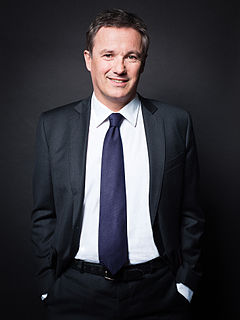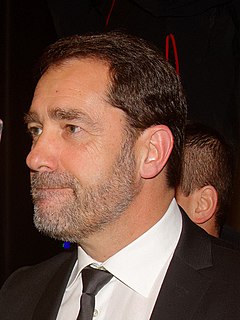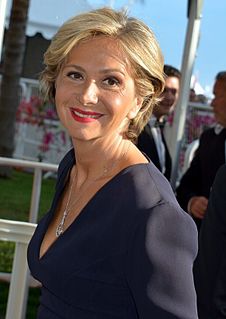
François Bayrou is a French centrist politician and the president of the Democratic Movement (MoDem), who was a candidate in the 2002, 2007 and 2012 French presidential elections.

Nicolas Jacques André Hulot is a French journalist and environmental activist. He is the founder and president of the Fondation Nicolas Hulot, an environmental group established in 1990.

Nicolas Dupont-Aignan, sometimes referred to by his initials NDA, is a French politician serving as President of Debout la France since 2008. He has been the member of the National Assembly for Essonne's 8th constituency since 1997 and was previously Mayor of Yerres from 1995 to 2017.
French presidential debates, broadcast on TV, traditionally occurred only between the two rounds of the presidential elections.
In 2017, for the first time, a presidential debate took place prior to the first round.

François Henri Goullet de Rugy is a French politician serving as Minister of Ecology since 2018. Since 2007 he has represented the Loire-Atlantique department, originally as a member of the Democratic and Republican Left, a parliamentary group that includes his former political party Europe Ecology – The Greens. In 2015 he joined the Ecologist Party and later La République En Marche parliamentary group.

The 11th constituency of the Pas-de-Calais is a French legislative constituency in the Pas-de-Calais département.

The 2017 French presidential election was held on 23 April and 7 May 2017. As no candidate won a majority in the first round on 23 April, a run-off was held between the top two candidates, Emmanuel Macron of En Marche! and Marine Le Pen of the National Front (FN), which Macron won by a decisive margin on 7 May. The presidential election was followed by legislative elections to elect members of the National Assembly on 11 and 18 June. Incumbent president François Hollande of the Socialist Party (PS) was eligible to run for a second term, but declared on 1 December 2016 that he would not seek reelection in light of low approval ratings, making him the first incumbent president of the Fifth Republic not to seek re-election.

Popular Republican Union is a French political party, founded in 2007 by François Asselineau. The ideology of the party is a hard Eurosceptic, and seeks the withdrawal of France from the European Union, the euro and NATO.
The 2012 leadership election of the Union for a Popular Movement (UMP), a political party in France was held on 18 November 2012. It renewed the leadership structures of the UMP following Nicolas Sarkozy's defeat in the 2012 presidential election and the party's defeat in the subsequent legislative election. The disputed results led to the first open crisis in the UMP since its creation in 2002.

The Union of Democrats and Independents is a centrist, liberal political party in France founded on 18 September 2012 on the basis of the parliamentary group of the same name in the National Assembly. The party was composed of separate political parties who retained their independence. As most of them have been expelled or have left, the Democratic European Force is the last founding party to participate in the UDI.

Legislative elections were held on 11 and 18 June 2017 to elect the 577 members of the 15th National Assembly of the French Fifth Republic. They followed the two-round presidential election won by Emmanuel Macron. The centrist party he founded in 2016, La République En Marche! (REM), led an alliance with the centrist Democratic Movement (MoDem); together, the two parties won 350 of the 577 seats – a substantial majority – in the National Assembly, including an outright majority of 308 seats for REM. The Socialist Party (PS) was reduced to 30 seats and the Republicans (LR) reduced to 112 seats, and both parties' allies also suffered from a marked drop in support; these were the lowest-ever scores for the centre-left and centre-right in the legislative elections. The movement founded by Jean-Luc Mélenchon, la France Insoumise (FI), secured 17 seats, enough for a group in the National Assembly. Among other major parties, the French Communist Party (PCF) secured ten and the National Front (FN) obtained eight seats. Both rounds of the legislative election were marked by record low turnout.

The French Socialist Party held a two-round presidential primary to select a candidate for the 2017 presidential election on 22 and 29 January 2017. It was the second open primary held by the center-left coalition, after the primary in 2011 in which François Hollande defeated Martine Aubry to become the Socialist nominee. Hollande went on to defeat incumbent Nicolas Sarkozy in the 2012 presidential election. However, because of his low approval rating, he announced that he would not seek re-election, becoming the first president of the Fifth Republic to decide not to run for a second term. The primary was contested by seven candidates, four from the Socialist Party and three representing other parties part of the left-wing electoral alliance.

Christophe Castaner is a French lawyer and politician who has been serving as the Minister of the Interior since 16 October 2018 and as the Executive Officer of La République En Marche! since 2017. From 17 May 2017 to 16 October 2018, he was Secretary of State for Relations with Parliament under Prime Minister Édouard Philippe; until 24 November 2017 he served as Spokesperson of the Government. He was also spokesperson for Emmanuel Macron during his campaign for the presidential election of 2017.

A leadership election for the presidency of The Republicans (LR) was held on 10 December 2017, the first since the refoundation of the party in 2015, before which it was known as the Union for a Popular Movement (UMP), and seventh overall including the UMP congresses.
The 2019 European Parliament election in France will be held on 26 May 2019, electing members of the 9th French delegation to the European Parliament as part of the European elections held across the European Union. The election will feature two major changes since the 2014 election, with the abolition of regional constituencies and return to national lists in addition to the increase in the number of French seats from 74 to 79 after the withdrawal of the United Kingdom from the European Union.
A by-election was held in Loiret's 4th constituency on 18 March 2018, with a second round on 25 March as no candidate secured a majority of votes in the first round. The by-election was prompted by the invalidation of the election of Jean-Pierre Door, candidate of The Republicans (LR), in the June 2017 legislative elections by the Constitutional Council on 18 December 2017. In the second round of the 2017 legislative elections on 18 June, the result was the closest in the country, with Door winning by 8 votes before the election was annulled.
The Aubervilliers Congress of the Socialist Party (PS) was held on 7 and 8 April 2018 near the Front Populaire station of the Paris Métro in Aubervilliers, Seine-Saint-Denis. The congress determined the political line of the party and elected Olivier Faure as the next First Secretary after the resignation of Jean-Christophe Cambadélis on 18 June 2017.
















